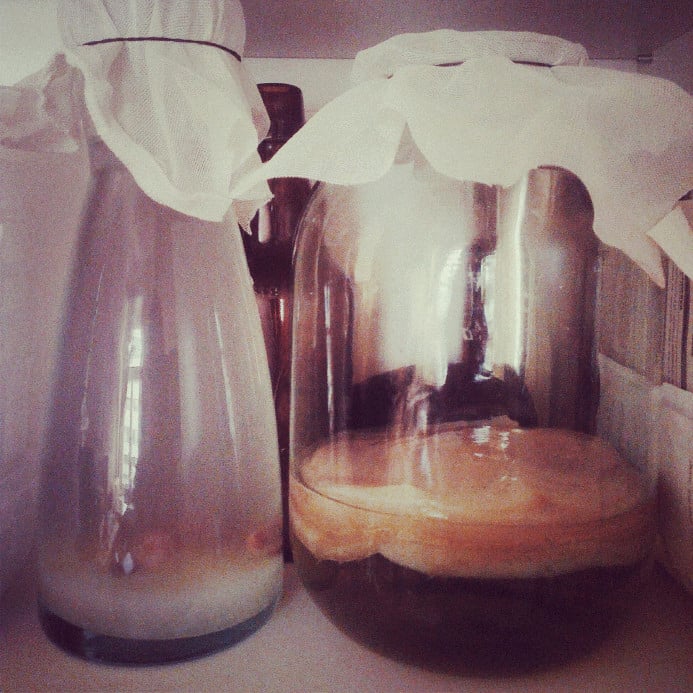Kombucha is one of the trendiest beverages on store shelves today. Like many other products that have found themselves in the spotlight, enthusiasts have touted kombucha as delivering a variety of health benefits, including boosting energy, improving digestion, perking up the immune system, and even preventing cancer. But where are these health claims coming from?
Unlike other trendy foods like kale and pomegranate, kombucha has acquired its reputation with little evidence to support any of its publicized benefits. While misperceptions and controversy continue to swirl around this fermented beverage, here’s what we know for sure:
 1. Kombucha consists of tea, sugar, a SCOBY – and a small amount of alcohol.
1. Kombucha consists of tea, sugar, a SCOBY – and a small amount of alcohol.
Kombucha is a mixture of regular black or green tea, sugar, and a SCOBY, or “symbiotic culture of bacteria and yeast.” These microorganisms are able to co-exist, forming a gel-like, rubbery film. The SCOBY is responsible for the fermentation process: after yeast breaks down the sugar into carbon dioxide and alcohol, bacteria then convert the alcohol into acetic acid, giving the beverage its vinegar-y tartness. Not all of the alcohol is used by the bacteria, so kombucha will always contain trace amounts of alcohol. Since most of the sugar added at the start of brewing is eaten up by the SCOBY, kombucha is a relatively low-calorie, low-sugar beverage in its natural state. However, many brands mix in fruit juice and additional sugars that can bring its calorie content up to 150-200 calories per 16-ounce bottle.
2. Kombucha may contain healthful ingredients, but specific amounts are uncertain.
Kombucha is often advertised as a good source of probiotic bacteria, which are important for maintaining a healthy gut and immune system. However, the amount and diversity of these organisms present in the bottled beverage can vary widely, depending on brand and production method. The beverage may also contain a variety of B vitamins, but again, it’s uncertain how much one serving contains. Plus, these vitamins can also be found in a wide variety of foods we consume every day, like whole grains, leafy greens, lean meats, and eggs. And that boost of energy kombucha fans feel after consuming the drink? It’s likely due to the caffeine content of the tea, a hint of carbonation, and a strong placebo effect.
3. Kombucha’s health claims are NOT supported by research or health professionals.
There’s no denying that many people consider kombucha to be a healthful beverage – googling gets you thousands of articles hyping its alleged health benefits. However, none of these attributes have been confirmed by research in humans. Of 65 journal articles† related to kombucha, only 19 involve human subjects. 10 of these describe adverse effects linked to kombucha consumption. No randomized trials – the gold standard for scientific research – have been published on the beverage’s health effects. That’s right – zero. So where are all the “miracle beverage” claims coming from?
4. Health benefits ascribed to kombucha have come ONLY from individual case reports.
Case reports are basically detailed stories about a person’s medical history and health testimonial. Case reports are considered the weakest kind of observational study and are at the bottom of the hierarchy of scientific research. The alleged health benefits ascribed to drinking kombucha have been passed on through word of mouth, advertising, and the proliferation of kombucha fans on the internet.
 5. Home-brewed kombucha consumption has been linked to adverse health effects.
5. Home-brewed kombucha consumption has been linked to adverse health effects.
Much of the published data related to this fermented beverage are case reports of toxicity, which has been fatal in some individuals. The biggest dangers from kombucha arise from home-brewed beverages that are prone to improper sanitation and bottling. The good news? The FDA has evaluated the practices of several commercial producers of bottled kombucha, and they’ve found no pathogenic organisms or other hygiene violations. Based on the potential to cause harm and no evidence of health benefits, reputable organizations including the Mayo Clinic are telling consumers to proceed with caution until more research is available.
6. Kombucha on store shelves is safe for most people, but there are healthier alternatives.
The kombucha you see on store shelves is most likely produced using safe manufacturing processes and won’t cause any harm. However, kombucha falls under the “herbal remedies and dietary supplements” category and is not considered a food or drug. That means producers are not routinely evaluated by regulatory agencies like the USDA or FDA. Accordingly, there could be wide variation in the ingredient content and safety of bottled kombucha.
If you like the taste of kombucha and enjoy drinking it, go for it – just don’t try to convince yourself that it’s the magical elixir it’s touted to be. Also, don’t forget other foods that have proven benefits for the digestive system. Seek out probiotics in yogurt, fermented foods like kimchi, tempeh, and pickles, and even some cheeses. Kombucha may or may not be a passing craze, but there are tons of other tried and true foods to explore.
† Based on searching in the PubMed database, one of the most comprehensive search engines for health and nutrition studies

 1. Kombucha consists of tea, sugar, a SCOBY – and a small amount of alcohol.
1. Kombucha consists of tea, sugar, a SCOBY – and a small amount of alcohol. 5. Home-brewed kombucha consumption has been linked to adverse health effects.
5. Home-brewed kombucha consumption has been linked to adverse health effects.